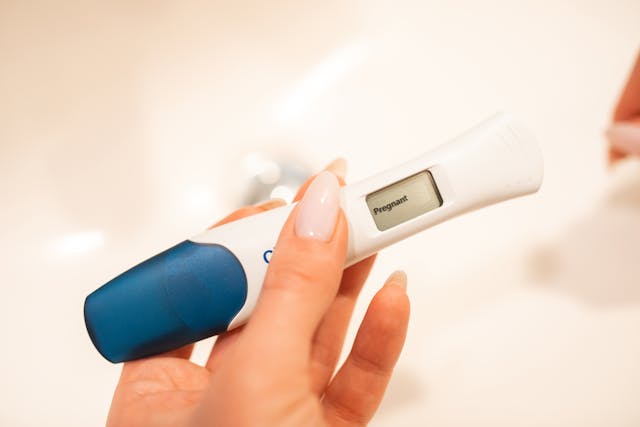It’s a common term used within the birthing community: Natural Induction. People who use the term don’t mean any harm by it. They wish to pass on information to mothers who are looking to help their babies be born sooner, using more “natural” methods than might be used by doctors or medically-minded midwives.
But, the irony is that “natural induction” is an oxymoron. Even though more gentle methods may be used to encourage labor to start, the fact is, there is nothing natural about induction.
Induction, no matter the method, is risky, because it’s encouraging a baby to be born before it is otherwise ready.
The Real Problem: Induction
The word induction, used in any form, should be taken quite seriously. Induction has it’s place when medically indicated. The real problem is with the rate at which induction is being used by professionals, including doctors and midwives, for arbitrary reasons.
Induction carries with it a myriad of risks, and “natural” induction methods are no different. Some of them may carry different risks than a medical induction, but carry risks nonetheless.
Induction Causes Increased Risk Of:
- Abnormal fetal heart rate
- Shoulder dystocia
- Cesarean section
- Forceps or vacuum extraction use at birth
- Neonatal Intensive Care Unit (NICU) stay needed
- Prematurity
- Jaundice
An induction is often one of the first steps in the cascade of interventions. The “cascade of interventions” is the term used to describe how one medical intervention can often lead to more medical procedures that carry with them even more risks. The cascade of interventions should be avoided, as it can compound the risks of childbirth ten fold.
Alternative Induction Methods
Women often go hunting for ways to “naturally” induce themselves after they get word that their doctor or midwife wants to induce them.
It’s misleading to call them “natural” induction methods. No induction is natural.
They are “alternative” induction methods. And every alternative induction method should be chosen with as much care and concern as any drug-based induction method. And if there is no compelling reason for induction, then no induction should be carried out, not even a so-called “natural” one.
It is not ethical or safe to have an induction based solely on any of the following reasons:
- Mother is “past due”
- Mother doesn’t want to be pregnant anymore
- The doctor or midwife will be out of town/unavailable around the time of the “due date”
- Mother wants the baby to be born on a specific date
Valid reasons for induction may include:
- High risk or suspicion of uterine infection
- The baby has stopped growing or developing
- Amniotic fluid levels pose a risk to the baby
- The placenta pulls away from the wall of the uterus before delivery (partial or complete placental abruption)
- Your placenta has begun to deteriorate
- You have a medical condition that may put you or your baby in danger
Is Postdate Pregnancy Cause for Induction?
Women are often told that they must be induced because they are overdue, but there is very little science to support the claim that overdue pregnancy is riskier than an average-term pregnancy, even if that pregnancy goes beyond 42 weeks gestation.
Midwife Gail Hart sums it up well in her article A Timely Birth:
“But if growth restriction and birth defects are removed, there is no statistical increase in risk until a pregnancy reaches 42 weeks and no significant risk until past 43 weeks. The primary “evidence” of a sharp rise in stillbirth after 40 weeks—often misquoted as “double at 42 weeks and triple at 43 weeks”—seems to come from one study based on data collected in 1958.”
Is “Big Baby” Cause for Induction?
Women should also seriously question if their provider wants to induce because their baby might be “too big”.
Ultrasounds are notoriously inaccurate at predicting the size of a baby. Additionally, there are numerous other factors to consider how easily a baby will be born, most of which cannot be determined before birth, including head circumference, body positioning, and fetal presentation, as well as mother’s freedom of movement during labor and choice of birthing positions.
~
The reasons for induction should always be questioned and weighed against the potential risks. If the reason for induction is weak, then labor should be left to start on it’s own.
And no induction method is natural, even if it uses natural ingredients. Please consider the risks of a baby being born before it’s ready.
Source:
http://pregnancy.about.com/od/induction/a/risksinduction.htm
http://www.mayoclinic.com/health/inducing-labor/PR00117
http://www.midwiferytoday.com/articles/timely.asp
http://www.givingbirthnaturally.com/reasons-to-induce-labor.html





Yes – and another huge situation in which induction should not be attempted – when the mother comes in thinking she is in labor and she is only in prodronal labor. Send the mother home – let her body do what it is designed to do. First time mothers almost always seek medical help before they are actually in active labor. I was one of them and when they tried to help my labor along, it ended in a cascade of interventions like you describe. My body, and the baby, were not ready yet. They simply needed more time.
Yes! Thanks for your perspective on that. The same thing happened to me with the SECOND baby. We all get done being pregnant, and have “false alarms”. While we are all responsible for our own choices, doctors are responsible for using medicine when it is not medically indicated. They are negligent if they do not inform mothers of the risks of induction and offer them the option to go home and wait it out.
Having had 2 medically necessary inductions, and even though they were life-saving in both cases after having seen the complications that come along with the process, when I was offered an induction for my slightly overdue but healthy pregnancy I declined an induction. That birth may have been overdue but she was healthy, I was healthy, and at almost ten pounds she was really no harder to birth than her smaller and brothers. I’m not at all a fan of inducing out of convenience, although I do know of one who opted for it at due date because her husband was deploying and she wanted him to meet his son.. still not medically necessary but I understand her decision. As for “natural induction” or encouraging labor.. well I personally don’t encourage it but I also stand by the fact that you can drink castor oil, walk for six miles and still not go into labor that evening if God doesn’t want you to. Why waste your time rushing something that He’s already in control of? KWIM?
Traci, thanks so much for your input. Firstly, yes, it’s a huge misnomer that bigger babies are harder to birth. It’s simply not true in most cases. The thing that makes birth hard is being strapped down on a bed and not able to move your body and make choices about labor position and birth position.
Secondly, I stand by my conviction that “natural” induction methods are NOT safe. Castor oil induction can cause stress to the baby, even if it does not actually “finish the job”. It can cause the baby to pass meconium before birth and a whole host of other problems. Same with herbs and oils. I do think there is a difference between that and some harmless walking or using acupressure points (I hope to go into those methods in the future.) Doing a little walking or rubbing on certain parts of your skin is not necessarily going to put a baby in stress (unless you are walking yourself into the ground and doing strenuous exercise you are not used to doing.)
Hmm. I’ll be looking forward to your post on some of more gentler induction methods that you mentioned in the comments. I’m having my first baby in August, and the nurse-midwives that we’re seeing will not allow you to go past 42 weeks. (I wanted a home birth, but insurance will not cover it.) What would you do in this situation? I certainly understand your point that no induction is natural, but at the same time it seems like more natural options would be better than having to be medically induced…